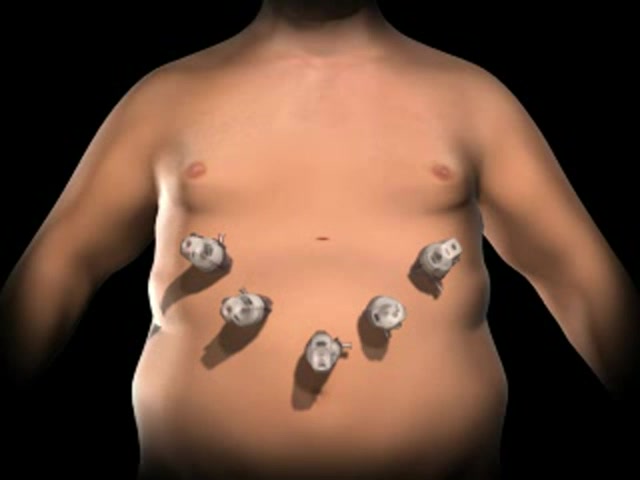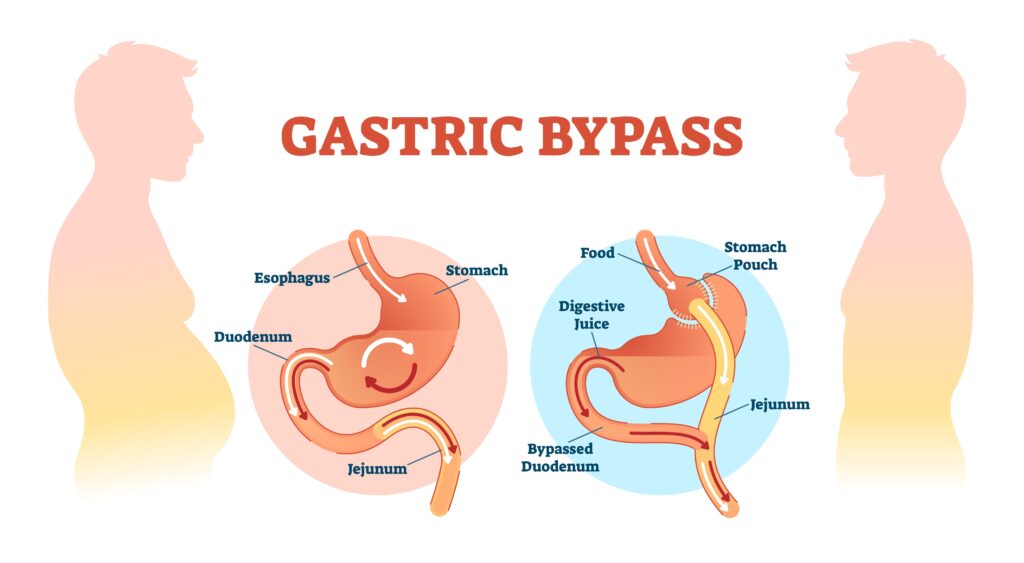
Gastric bypass surgery, originally developed in 1968, continues to be widely regarded as the gold standard in weight loss surgery, especially in Texas. At BMI of Texas in San Antonio, we’ve helped thousands of patients undergo this life-changing procedure with consistently excellent outcomes. Click the link to hear their success stories.
The surgery involves two key steps:
First, a small stomach pouch—about the size of an ounce—is created to restrict the amount of food a patient can consume. Second, the small intestine is rerouted to bypass a portion of the digestive tract. This reduction in absorption, paired with lower food intake, accelerates weight loss and significantly improves metabolic health, particularly blood sugar control.
At BMI of Texas, all of our gastric bypass surgeries are performed using the da Vinci Surgical System, a robotic platform that enhances surgical precision and control while ensuring a minimally invasive experience, reduced complication rates, and a smoother recovery for patients.
As a metabolic surgery, robotic gastric bypass not only drives rapid weight loss but also reduces systemic inflammation and supports long-term diabetes remission. One common side effect is dumping syndrome, often triggered by refined sugars. While uncomfortable, it naturally encourages healthier eating habits and reinforces the lifestyle changes needed for sustained success.
Because part of the small intestine is bypassed, lifelong supplementation is necessary to prevent deficiencies. Patients are advised to take daily multivitamins, calcium, vitamin B12, and other nutrients to maintain optimal health.
To learn more about gastric bypass surgery or to understand the cost of robotic gastric bypass surgery, reach out to the experts at BMI of Texas in San Antonio. We’re here to help you take the next step in your weight loss journey with world-class care and personalized support.
This is a modal window.
 BMI of Texas
BMI of Texas BMI of Texas
BMI of Texas
What to Expect Post-Op with Gastric Bypass Surgery
After gastric bypass surgery, patients typically stay in the hospital for one to two nights. The focus immediately after surgery is on walking frequently and doing breathing exercises with an incentive spirometer. We provide blood-thinning medication to prevent clots. A few hours post-surgery, patients can start sipping liquids.
Post-op Day One: Transition from IV fluids to oral intake and liquid pain medicine. With our specialized anesthetic, patients usually experience minimal pain, and some may even go home the same day.
Day Two: Most patients are ready for discharge. However, if you need more time, that’s completely fine. Everyone’s recovery is different, and we prioritize your comfort.
For more information about gastric bypass surgery costs or to discuss your options at BMI of Texas in San Antonio, call us today!
The impact of gastric bypass on morbidity and mortality rates in young adults
For overweight young adults, extra pounds can take a significant physical and mental toll on your well-being over the years. Unfortunately, these young adults often develop weight-related problems due to being overweight as children or adolescents. Carrying extra weight for decades can result in an increased risk of developing many serious and chronic health issues. However, there are solutions, such as the gastric bypass surgery, which can help impact and reduce these problems.
What are the negative effects of extra weight?
Obesity has reached epic proportions in the U.S., affecting over one-third of adults, according to statistics from the Centers of Disease Control and Prevention (CDC). It also affects many young people, with about 17% or 12.7 million children and adolescents age 2 to 19 having obesity. Many of them continue to have the following weight-related issues throughout young adulthood and beyond:
- High blood pressure
- Type 2 diabetes
- Stroke
- Coronary heart disease
- Gallbladder disease
- Cancers – such as those that affect the breast, prostate and colon
- Sleep apnea
- Respiratory problems
- Lower self-esteem
- Depression
- Social stigma
- Discrimination
Just as the reasons for weight gain can be varied, it can also be difficult and sometimes complicated to lose weight in a healthy way and keep it off. Doctors may tell their patients they’re overweight and need to eat a healthier diet and get more exercise, but this is far easier said than done.
And unfortunately, the effects of being overweight can make these healthier choices more difficult to begin and maintain. For example, if you’re obese, you’ll have an increased risk of depression. This can make you more likely to overeat and to reach for sweets or carbohydrates. You’ll also probably feel lethargic and will be less likely to exercise or live an active lifestyle. In this vicious cycle, you’ll gain even more weight.
Therefore, losing weight and keeping it off can be extremely frustrating and difficult, resulting in one failed diet after another or an unhealthy cycle of weight loss and gain. As a result, many people have turned to weight loss surgery – particularly gastric bypass – as a tool to help them lose weight.
Gastric bypass surgery has been performed since 1968, and it’s been improved and refined since then. Today, it accounts for nearly half of all weight loss surgeries, so it has a strong track record of data as well as positive results over the years.
The following information from BMI of Texas explains what you need to know about whether gastric bypass surgery can be appropriate for overweight young adults, as well as how it can impact morbidity and mortality rates:
What are the benefits of gastric bypass?
Gastric bypass surgery can be a useful tool in accelerating weight loss. It changes your body in several ways that make weight loss much easier and quicker. This surgery gives young adults many of the same benefits that it provides for older patients, but the positive effects may be even greater.
That’s because if you have the surgery and lose excess weight as a young adult, you’re able to avoid additional years of health concerns. This can help reduce what’s known as morbidity and mortality – with morbidity referring to a diseased state and mortality referring to the rate of death. In other words, gastric bypass surgery may be able to help young adults lead longer, healthier lives.
In one study, a group of young adults who had gastric bypass or laparoscopic sleeve gastrectomy between the ages of 18 and 24 were questioned 6 months to 6 years after their surgery. Gastric bypass patients were able to achieve an average mean weight loss of 35.6%. The study also found that young adults may need additional support to help them continue their behavioral changes post-operatively, since adherence tended to slip over the years.
Gastric bypass offers young adults the following benefits:
- Results in rapid, significant, long-term weight loss
- Reduces the risk or severity of, or even eliminates, many present and future physical and mental health problems
- Is as safe and effective in young adults as it is in adults
- Long history of proven results

What are the benefits of gastric bypass?
Gastric bypass surgery is a powerful tool for accelerating weight loss, offering numerous health benefits for young adults. This gastric bypass procedure changes your body in ways that make weight loss faster and more manageable. In young adults, the long-term benefits of gastric bypass surgery may be even more significant than in older patients, helping to reduce morbidity and mortality rates by preventing years of weight-related health issues.
A study on young adults aged 18-24 who had gastric bypass surgery or laparoscopic sleeve gastrectomy found an average weight loss of 35.6%. However, many patients require additional behavioral support post-operatively to maintain these results over time.
Key benefits for young adults undergoing gastric bypass surgery include:
- Rapid and significant long-term weight loss
- Reduced risk of physical and mental health problems
- Safe and effective results in young adults and adults alike
- Proven long-term success and history of positive outcomes
What’s involved with gastric bypass surgery?
If you’re having gastric bypass surgery, it will be performed in two parts. In the first, your stomach will be divided into two portions, where one portion is much larger than the other. The smaller part is then sewn or stapled together to create a new, smaller, stomach. This new “pouch” holds only about an ounce of food, so you’ll feel full quicker, and will eat less.
In the second part of the surgery, your surgeon will then disconnect your new, small stomach pouch from the rest of your stomach and the first part of the small intestine (duodenum). In a surgical technique known as a Roux-en-Y, the pouch will then be connected to a part of the small intestine that’s slightly farther down (in the jejunum). This allows food to go from your stomach into the jejunum and bypass the duodenum. As a result, your body will absorb fewer calories (and nutrients) which is why you’ll need to continue to take vitamin and mineral supplements for the rest of your life.
In addition to making you feel fuller, faster when eating, the surgery also alters your body’s neurochemical pathways and hormones so you lose weight rapidly. You’ll have better control over your blood sugars, which has been linked to many different chronic diseases.
What happens after gastric bypass surgery?
Gastric bypass surgery is often performed laparoscopically, allowing for smaller incisions and a quicker recovery. Patients typically stay in the hospital for 2 to 3 days, and most can resume normal activities within 3 to 5 weeks. If an open surgery is required, recovery times may be longer.
While gastric bypass surgery has a strong safety record, there are risks such as constipation, gallstones, or blood clots. However, complications are rare and can often be managed with blood-thinning medication and post-operative activity.
What should you consider before having gastric bypass surgery?
Gastric bypass surgery isn’t typically the first step for losing weight. It is often considered when other methods, like lifestyle changes, have not resulted in sustained weight loss. Candidates usually have a body mass index (BMI) of 35 or higher. For example, someone 5 feet 4 inches tall weighing 235 pounds or more may be eligible for gastric bypass surgery.
To ensure success, patients must embrace a new lifestyle post-surgery. This includes increasing protein intake, avoiding refined carbohydrates, and managing dumping syndrome, which can occur with sugary foods. You’ll need to eat smaller, frequent meals, and take multivitamins, calcium, and B12 supplements for life.
Stress management is also essential post-surgery. If stress eating was a challenge before, learning new coping mechanisms is key. At BMI of Texas in San Antonio, our Behavioral Health Specialist is available to guide you through both pre, and post-surgery challenges.
Before considering gastric bypass surgery, weigh the potential benefits and lifestyle changes. It’s crucial to be physically and psychologically prepared for the surgery and the new habits that follow.If you’re one of the many overweight young adults who’s struggling with obesity and wants to find out more about gastric bypass and other weight loss options, contact BMI of Texas in San Antonio today at 210-405-6424. Our experienced doctors will make a recommendation based on your unique needs and circumstances, and we’ll set up support such as a nutrition team to help you succeed with your post-surgery goals should you choose gastric bypass. We even have a fitness center where every piece of equipment has been built for bariatric patients. We’ll do everything we can to help you succeed in achieving a healthier lifestyle!


